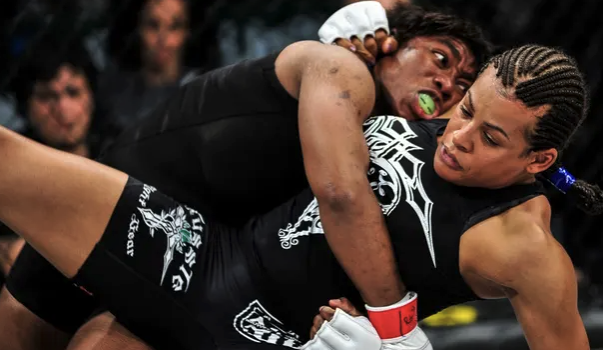When FINA announced that natal males would not be able to compete alongside women in swimming, it was rewritten by much of the press as well as trans activists as ‘trans women banned from competing’. But no one was ‘banned’, the rules have simply been clarified.
The rules are now clear; a person of the male sex that has gone through any stage of puberty is not allowed to compete against females, which puts a stop to the unfairness that Olympic medallist Sharron Davies has spoken out about. FINA has also established an ‘open’ category, as Davies has advocated for, where transwomen can compete.
The MMA fighter Fallon Fox was invited onto BBC Radio 4’s Today programme to comment on the decision. The BBC was apparently unaware that Fox, who previously served in the armed forces, had boasted about injuring their opponents. As a biological male who was the first openly transgender athlete in MMA history, the fighter’s style was so aggressive that Fox sent female Tamikka Brents to the hospital with a crushed skull, needing surgical staples. As Fox tweeted: ‘For the record, I knocked two out. One woman’s skull was fractured, the other not. And just so you know, I enjoyed it. See, I love smacking up TEFS (sic) in the cage who talk transphobia nonsense. It’s bliss! Don’t be mad,’ adding winking and kissing lips emoji.
The BBC’s Justin Webb, who interviewed Fox, later tweeted that he and his producers had ‘no idea’ about Fox’s past, before adding that the issue needed to be treated ‘fairly’. This is a big admission from one of the BBC’s most well-known journalists, and hopefully it marks the beginning of a sea change.
But I’m not holding my breath. In recent years the corporation has allowed itself to be hijacked by a small but vocal minority on this issue. Fox’s appearance was just one example; previously a BBC report saw the words of a rape victim changed to accommodate trans activists, changing the male pronouns she used to describe her rapist to ‘they’.
Yet perhaps the most irritating element of all was Fox’s attempts to hide behind other minority groups to make the case for the inclusion of males in female sports. Black people, and gay people were all used to argue that anybody who disagrees with the inclusion of males in female sports is a terrible bigot.
FINA has taken a brave stand against the inclusion of males in female sports, and I commend them. But I condemn the decision by the BBC to interview a violent male without a single coherent argument to speak on the topic of women’s sports.











Join the discussion
Join like minded readers that support our journalism by becoming a paid subscriber
To join the discussion in the comments, become a paid subscriber.
Join like minded readers that support our journalism, read unlimited articles and enjoy other subscriber-only benefits.
Subscribe